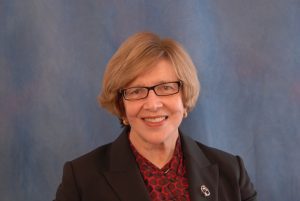
By Lillian Abbott Pfohl
Rosemary S. Pooler passed away on August 10, 2023, at age 85.
Lillian Abbott Pfohl, her career law clerk since 2009, has submitted this remembrance.
Judge Rosemary S. Pooler led a trailblazing life, one that leaves behind a variety of legacies: her family, her consumer and political activism, and her judicial legacy as a judge both in the Northern District and on the Second Circuit.
Born in 1938 in Flatbush, Brooklyn, she graduated from James Madison High School and then Brooklyn College. She earned a master’s in history from the University of Connecticut, where she met her husband, Bill Pooler. Finding herself the trailing spouse while he studied for his Ph.D. at the University of Michigan, she decided to attend law school. One of just six women in her graduating class, she received her J.D. in 1965.
Bill Pooler accepted a teaching job at Syracuse University’s Maxwell School of Citizenship, and Judge Pooler practiced law with a small firm. But she soon found herself in a variety of public service jobs primarily focused on consumer protection issues. In 1975, she became chair of the New York State Consumer Protection Board, serving until 1980.
During her tenure she published widely distributed booklets that helped grocery shoppers decode the expiration dates on canned goods and advised car buyers of their rights under New York’s “lemon law,” which protects consumers who find themselves with a vehicle that has significant defects.
She ran for Congress twice, coming within a thousand votes of defeating Republican incumbent George C. Wortley in 1986. A second attempt in 1988 also fell short, and Judge Pooler decided that was the end of her political career. She was persuaded to make one more attempt at elected office by a friend who wanted her to run for Justice for the Fifth Judicial District. Reluctant to toss her hat into the arena once more, she decided to take a chance when her friend pointed out there were two empty seats, so she would just have to come in second. “I can do that!” she replied.
She became the first woman Justice elected to the Fifth Judicial District. Magistrate Judge Thérèse Wiley Dancks remembers that “she was the only woman judge at the trial court level around here when I first started practicing, and I very much enjoyed going to motion term to argue motions in front of her. She didn’t always find in favor of the positions I argued, but she always treated me and everyone in her Court with the utmost respect.”
President Bill Clinton appointed her to serve on the United States District Court for the Northern District of New York in 1994—the first woman to hold that position. Chief Judge Brenda Sannes was an Assistant United States Attorney at the time, and recalls “that prosecutors in the office wondered how she would fare, without having any federal court experience. But Judge Pooler quickly put any concerns to rest, garnering a reputation as a smart, well-prepared judge who followed the law.” Judge Sannes discovered Judge Pooler’s “delightful sense of humor” when she and Assistant United States Attorney Steve Green “tried an eleven-defendant drug conspiracy case before her for almost three months in 1996. Every morning before trial, counsel met in chambers with Judge Pooler to sort out the issues of the day. Judge Pooler once noted that we were there to discuss ‘housekeeping,’ and then quipped, ‘what do I know about housekeeping.’” Judge Sannes also remembered that when Judge Pooler saw a newspaper article “describing the configuration of the tables and chairs to seat eleven defendants and their counsel, she wondered how it was that journalists found furniture ‘to be the salient issue.’”
Judge Pooler often talked about that trial with her law clerks, describing the complexities of managing a courtroom with so many defendants and their counsel. She recalled the jury fondly, recounting how the long trial meant the jurors celebrated birthdays together and often coordinated their clothing for the holidays: red for Valentine’s Day, green on St. Patrick’s Day. And she discussed how difficult it was to be bound by the United States Sentencing Guidelines – which were then mandatory – and unable to exercise discretion for some of the defendants who were at the lower level of the conspiracy. She always said sentencing was the hardest part of being a district court judge, and continued to pay close attention to the issue when she joined the Second Circuit in 1998. She was the second woman appointed to the Second Circuit, and the first judge to be resident in Syracuse since Judge William J. Wallace retired in 1907.
During her time with the Second Circuit, Judge Pooler gained a reputation for championing the rights of criminal defendants and consumers. During arguments in United States v. Padilla, she repeatedly challenged the government’s argument that the war against terror meant the government could indefinitely detain an American arrested as an enemy combatant and deny him contact with his lawyer. “As terrible as 9/11 was, it didn’t repeal the Constitution,” she said. Her opinion in Tanzir v. Tanzir – holding that three Muslim men were legally entitled to seek damages from federal officers who allegedly tried to force them to violate their religious beliefs by spying on other Muslims – was affirmed by the Supreme Court.
Her opinions in American Express Co. v. Italian Colors Restaurant sought to protect the right of consumers and others to arbitrate as a class even when a contract contained a class arbitration waiver. Judge Pooler wrote that such waivers were not enforceable where plaintiffs could demonstrate the cost of prevailing on the claim in individual arbitration would exceed any potential recovery. While the Supreme Court ultimately reversed, she remained proud of her work on the cases. She would tell people the Second Circuit panel in that case was not wrong—it just wasn’t last.
Judge Pooler was an active member of the Central New York Bar Association for years, and her trailblazing legal career served as an inspiration to many. “As I sat at her funeral and looked around the room at all the women judges, both state and federal, from the Upstate New York region, I realized that we all benefitted from her proverbial breaking through the glass ceiling. We know it was never easy for her, but she made it easier for us and for that we are forever grateful,” Magistrate Judge Danks said. “She mentored so many of us, whether we aspired to the bench or just to be good lawyers, helping us develop a strong sense of self-worth, teaching us how to solve problems and deal with tough times, giving us the courage to follow our paths and pursue our dreams in the legal profession.”
Judge Pooler enjoyed having other women join her on the bench. During the last few years she and the women judges of the Northern District enjoyed regular lunches together (which she dubbed “Lady Judge Lunch”). “Our discussions were diverse, not just about the law but also about our families, what we were reading or watching, the exercise routines we were doing, and what travels and adventures we had taken or were about to take,” Magistrate Judge Danks said. Chief Judge Sannes also remembers those lunches fondly: “we discussed books that we loved, the grandsons she adored, and the news of the day. I will always treasure our time together talking and laughing on long car rides to and from judicial conferences. She was a mentor and a dear friend with a great spirit and zest for life.”
Judge Pooler regularly said one of her favorite parts of being a judge was working with a new clerk class every year. Working with young people, she felt, helped keep her young. She only hired people she fell in love with during their interviews, and they became an integral part of her life. Chambers boosted three bulletin boards filled with pictures of clerks’ children, and one clerk outdid himself when he taught his sons to call her “Grandjudge.” Clerk reunions were large and well-attended. She made a point of trying to call former clerks on their birthdays, and always wanted to know what was going on in their lives.
I always told people I wanted to be the Judge when I grew up—she lived life fully, determined to pack in as much as possible. She was an incredibly vibrant person who threw off a warm energy that filled every space she was in. Constantly on the go, she loved her work on the bench, the opera, dinners with friend, multiple book clubs and most especially her family. Her grandsons Broden and Asher were the light of her life, and she doted on them. She is missed, each and every day, by many. May her memory be a blessing.

